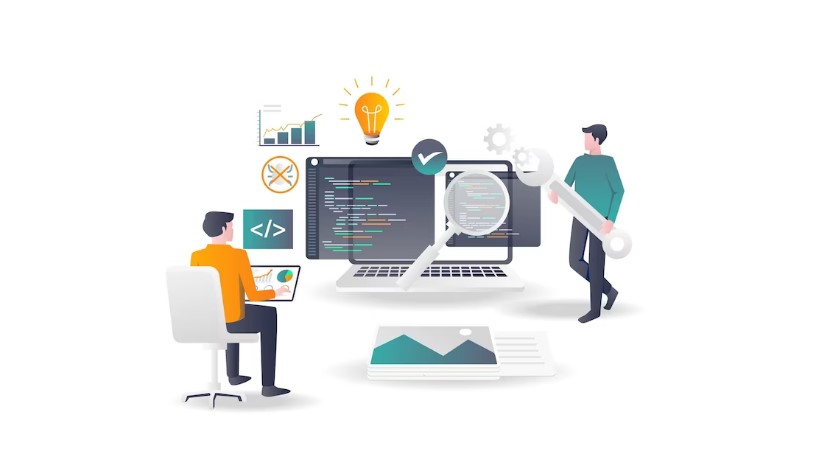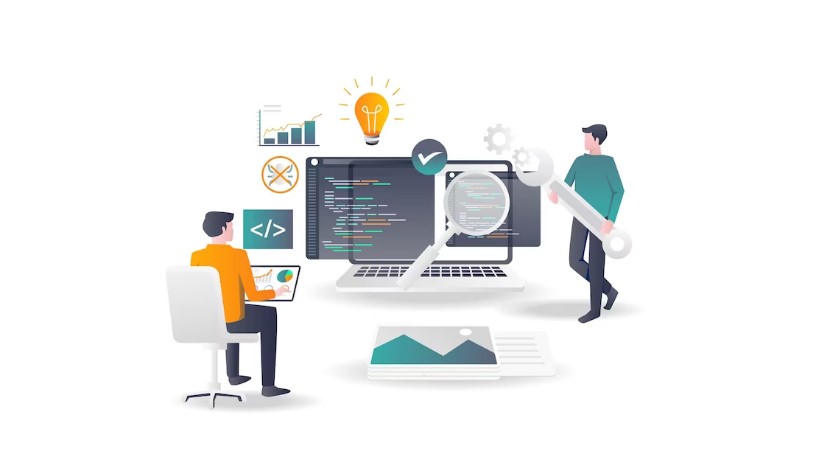Software Development| Software developer salary software

Software Development
It involves a variety of tasks, including programming, testing, debugging, and documentation, and it is typically undertaken by a team of software developers who work together to create high-quality software products.
The software development process typically involves several stages, including planning, analysis, design, implementation, testing, and maintenance. During the planning stage, the software development team identifies the needs of the software users and determines the overall goals and requirements of the project.
In the analysis stage, the team gathers information about the software users, the system environment, and other factors that could impact the development process. This information is used to create a detailed design specification, which outlines the software’s features and functionality.
In the design stage, the software development team creates a detailed plan for the software’s architecture, interface design, and data structures. They also develop a set of algorithms and flowcharts that will be used to implement the software’s functionality.
The implementation stage involves actually coding the software, using the design specifications as a guide. This process typically involves several rounds of coding, testing, and debugging to ensure that the software functions properly.
During the testing stage, the software development team conducts a variety of tests to ensure that the software is working correctly and meets the design specifications. This may involve unit testing, integration testing, and other types of testing.
Finally, the maintenance stage involves ongoing updates and improvements to the software, as well as bug fixes and other enhancements. This stage is critical to ensuring that the software remains up-to-date and continues to meet the needs of its users.

How to become a software developer
Becoming a software developer typically requires education, training, and experience. Here are some steps you can take to become a software developer:
Education: Most software development jobs require a bachelor’s degree in computer science, software engineering, or a related field. Some employers may also accept candidates with degrees in mathematics or other technical fields.
Learn to Code: It’s essential to develop a strong foundation in coding languages such as Java, Python, C++, or JavaScript. Start with basic courses and gradually progress to more advanced concepts.
Build Projects
Develop your programming skills by building your own software projects. Start with small applications and gradually move on to larger, more complex projects.
Join a Coding Bootcamp: Coding boot camps offer intensive training in
programming languages and provide hands-on experience in developing software applications.
Participate in Open Source Projects: Participating in open-source software development
projects can provide valuable experience and help you build a portfolio of work that demonstrates your skills.
Internships and Apprenticeships: Internships and apprenticeships
can provide valuable experience and help you to build your network of contacts in the software development industry.
Continuous Learning: The field of software development is constantly evolving, so it’s important to keep up with the latest technologies, frameworks, and tools. Attend conferences, workshops, and other training opportunities to stay up-to-date with the latest trends.
Build a Portfolio: As you gain experience, build a portfolio
of your work to showcase your skills and experience to potential employers.
Becoming a software developer requires hard work, dedication, and ongoing learning. With the right combination of education, training, and experience, you can build a successful career in this exciting and rapidly growing field.
What does a software developer do
A software developer is responsible for designing, creating, testing, and maintaining computer software. Here are some of the typical tasks a software developer may perform:
Design: A software developer works with other members of a development team to design software applications that meet users’ needs.
Coding: A software developer writes code using programming languages such as Java, Python, C++, or JavaScript to implement the software’s design.
Testing: A software developer performs testing to ensure that the software functions properly and meets the design specifications.
Debugging: A software developer identifies and fixes problems with the software code to ensure that the software functions properly.
Maintenance: A software developer is responsible for maintaining the software over time, including making updates and bug fixes as necessary.
Documentation: A software developer creates documentation that describes
how the software works, how to install it, and how to use it.
Collaboration: A software developer works closely with other members of a development team, including project managers, designers, and other developers.
Continuous learning: A software developer stays up-to-date with the latest technologies and programming languages to ensure that their skills remain relevant and valuable.
Overall, a software developer is responsible for creating high-quality software products that meet users’ needs and help businesses achieve their goals.
What is a software developer?
A software developer is a professional who creates, designs, and maintains computer software applications. They are responsible for developing software products
that meet the needs of users, as well as the technical requirements of the software itself.
A software developer typically works as part of a team, collaborating with other developers, project managers, and designers to create software applications.
They are skilled in programming languages such as Java, Python, C++, or JavaScript, and use these languages to write the code that makes up the software.
A software developer is responsible for the entire software development lifecycle, including design, coding, testing, and maintenance. They may work on a wide range of software applications, from mobile apps to enterprise-level software solutions.
Overall, a software developer is a highly skilled professional
who plays a critical role in creating software products that power modern businesses and organizations.
They must be able to work effectively as part of a team, communicate clearly, and have a strong commitment to ongoing learning and professional development.
Contact us

Pak Address:
Johar Town H Block lahore, Pakistan
amnakhank22@gmail.com

+92 316 5544991